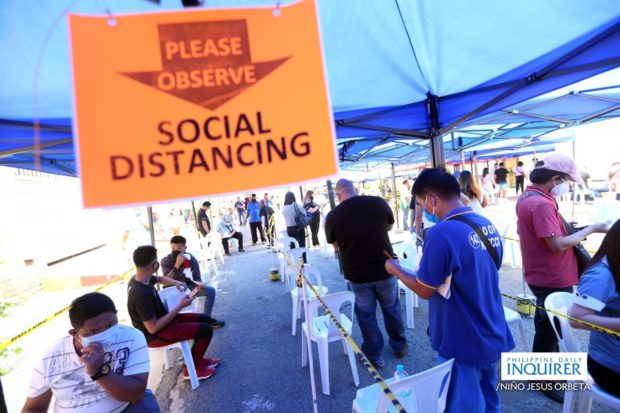MANILA, Philippines — The gradual decrease in the daily number of coronavirus cases stems from a change in people’s behavior and the effectiveness of advertisements featuring President Rodrigo Duterte.
This was the explanation given by Secretary Carlito Galvez Jr., the chief implementer of the Inter-Agency Task Force on Emerging Infectious Diseases (IATF), during the President’s late-night briefing on Wednesday.
Recently, the Department of Health (DOH) reported fewer COVID-19 cases than usual, with only 1,990 on Tuesday and at 1,910 on Wednesday.
The DOH noted, however, that 11 laboratories were not able to submit their data to the COVID-19 data repository system on Tuesday.
“‘Regarding the drop in our cases, one factor is the change of behavior of the people because we had a commercial that included you, along with what we call infomercials from the business sector. Those are the two factors that we saw having traction,” Galvez, speaking partly in Filipino, told Duterte.
“And we believe that with our massive infomercials, sir, — the ‘Ingat Buhay Pa Sa Hanap Buhay’ and the ‘Ingat, Angat Tayong Lahat’ of the business sector — [the figures] changed somehow,” he added.

Taxpayers observe social distancing on the last day of filling of income tax returns at the Bureau of Internal Revenue, Intramuros, Manila on Monday, June 15, 2020. 📷: Niño Jesus Orbeta / Philippine Daily Inquirer
Galvez cited the case of Cebu City, which was previously placed under an enhanced community quarantine due to a rapid rise in the COVID-19 cases. But now, the city had since performed better — which the retired military general attributed to an overall change in behavior after Duterte reprimanded city residents for breaking quarantine rules.
According to the DOH COVID-19 tracker, Cebu City has experienced a gradual flattening of the coronavirus curve, compared to alarming figures it recorded in June and July 2020.
“Last week, sir, they had seven days without casualties. There were no deaths reported,” Galvez told Duterte. “It was reported in a newspaper that Cebu is now performing very well.”
He noted that since Sept. 1, when Cebu City was placed under a modified general community quarantine, the number of cases there had been very low.
That meant, he said, that it was important for people to realize the importance of changing their behavior.
Last Oct. 8, presidential spokesperson Harry Roque announced that Duterte would be appearing in an advertisement that would promote safety in workplaces and in public to avoid coronavirus transmissions.
The campaign was reported to be a private sector initiative endorsed by the IATF to boost consumer confidence as the government gradually started to open up the economy, which had been severely affected by the lockdowns since March.
“No one expected COVID to happen, but it showed the ‘bayanihan’ spirit of the Filipino, as shown by the private sector who donated isolation centers, medical equipment and testing kits, some came earlier than the government response,” Roque said.
The advertisements have yet to be circulated widely over social media, as they generally appear before government press conferences. However, Galvez believes that the infomercials already have an effect on the reduction of cases.
“We saw that our decision to change tactics was good, that we urged the people themselves to help fight the pandemic. They believe in you, Mayor. When we had the informatics in the buildings, the infomercials, we saw that they really had an impact,” Galvez said.
But despite the steady drop in its COVID-19 cases per day, the Philipines has entered the list of top 20 countries with the most coronavirus infections, regardless of active or recovered cases.
As of Wednesday, the total number of COVID-19 cases nationwide had risen to 346,536, with 46,227 of these active, while recoveries were at 293,860 and deaths were at 6,499.
[atm]


